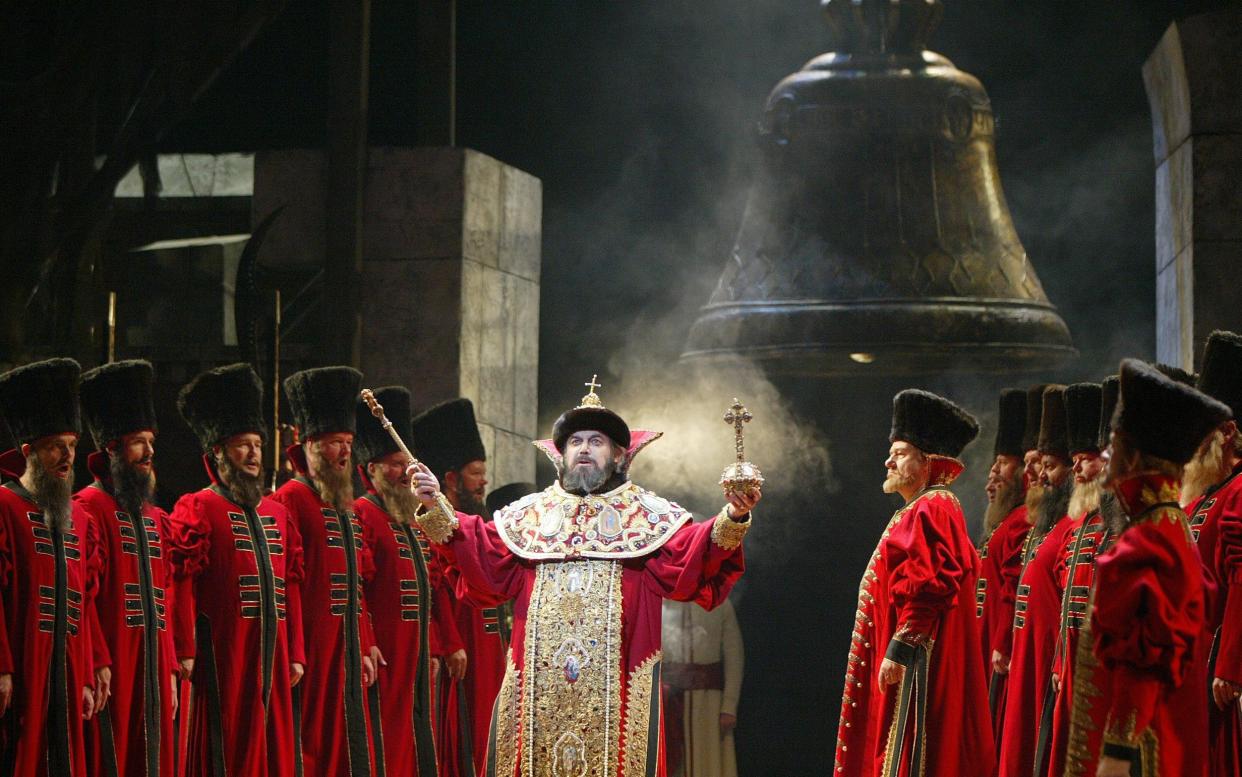How Modest Mussorgsky’s Boris Godunov captured the heart of a nation

This magnificent historical epic is the cornerstone of the Russian operatic repertory – the embodiment of the soul of a nation and its tragedy, expressed though music of rough-hewn grandeur and visceral energy.
Plot
The nobleman Boris Godunov is crowned Tsar – a position he has reached by secretly arranging the murder of the legitimate heir, the boy Dmitri. His crime haunts him, but he vows to rule wisely. No body was ever found, according to the monk Pimen, who is chronicling the history of Russia in a monastery, so he inspires the ambitious novice Grigori to present himself to the world as Dmitri, as though the murdered boy had merely gone into hiding and had now emerged grown to adulthood. To gain support for the cause, Grigori travels as Dmitri to Poland, where he falls in love with the noblewoman Marina. Her Jesuit confessor Rangoni persuades her to use his infatuation to spread Catholicism to Russia. Surrounded by unscrupulous advisers, Boris is told about Grigori-Dmitri’s campaign. Terrified to the point of insanity by visions of the murdered Dmitri, he summons his son and as he lies dying, implores him to attend to the well-being of Russia. Grigori-Dmitri marches with his rag-tag army through the Kromy forest towards Moscow. A holy fool laments the wretchedness of Mother Russia and foretells more woe to come.
Background
Drawing its text from a five-act drama by Alexander Pushkin, inspired by Shakespearean tragedy and loosely based on historical events that occurred between 1598 and 1605 after the demise of Ivan the Terrible, this opera had a long, troubled and complex gestation.
Modest Mussorgsky was a lowly civil servant with a serious drink problem, pursuing music as a private enthusiasm at a time when it was impossible in Russia to make a professional career as an opera composer. Operatic culture there was dominated by foreign (mostly Italian) imports, and the management of the Mariinsky Theatre in St Petersburg rejected Mussorgsky’s first seven-scene version of Boris Godunov as too bizarrely original and unlike the fashionable models of Verdi or Gounod. Over the next few years, he revised and expanded the opera radically, changing the ordering of the scenes, adding the Polish act and the role of Marina to balance what was otherwise a cast of almost entirely male soloists. This version was successfully staged in 1874.
After Mussorgsky’s death in 1881, Rimsky-Korsakov produced two editions of the opera, softening Mussorgsky’s rough edges and providing a smoother, richer orchestration (an aspect of composition at which Mussorgsky was not conventionally adept). It was in the second of Rimsky’s editions that Diaghilev brought the opera to Paris and London during the Edwardian era, with Feodor Chaliapin in the title role – performances that became legendary and established the opera’s popularity in the west.

Rimsky’s alterations have now fallen from favour as a misrepresentation of the raw barbaric splendour of Mussorgsky’s intentions, to be largely replaced by an edition more respectful of the original by the British musicologist and conductor David Lloyd-Jones. There have also been several revivals of Mussorgsky’s first version of 1869: this has the advantage of being shorter and cheaper to stage, but it involves the sacrifice of some of Mussorgsky’s finest music.
What makes it so great?
From the opera’s arresting opening scene, in which the police taunt and goad the anxious proletariat of Moscow, to the Holy Fool’s closing lament, Mussorgsky is working through the simplest of musical means. The orchestration is sparse, the harmony unsubtle and almost entirely free of counterpoint; there are few extensive or hummable melodies in the opera (though it is peppered with some wonderful folk-tunes, and the “Slava” national anthem at Boris’ coronation). Yet every note of the vocal line is vividly characterful and subtly inflected – this is truly a drama told through music, and it is one in which moments of silence are made richly eloquent. Also notable is Mussorgsky’s innovative habit of ending scenes on a fade-out rather than a crashing final cadence.
Boris is the focus, a truly tragic figure whose psychological breakdown is vividly communicated, but it is the chorus, representing the Russian people, which dominates the opera to an unprecedented extent – something that would later be enormously influential on operas such as Britten’s Peter Grimes.
Recordings
Top of my list is an electrically vivid recording on which Claudio Abbado conducts the Berlin Philharmonic Orchestra and a superb cast using the Lloyd-Jones edition (Sony); for those who prefer Rimsky-Korsakov’s less abrasive orchestration and harmonies, a 1962 recording conducted by André Cluytens with the imperious Boris Christoff in the title role can be recommended (EMI Classics). Recordings from the pre-LP era of Feodor Chaliapin singing highlights from the opera have great interest, even if they communicate little sense of his personal charisma (Naxos).
On DVD, there are three strong options. Masterly in both its filmic fluency and richness of atmosphere, Andrei Tarkovsky’s production was first staged at Covent Garden in 1983. Seven years later, it transferred to what was then the Kirov (now Mariinsky) Opera in St Petersburg, where it was filmed. The British bass Robert Lloyd sang and acted the title-role nobly in both sets of performances; Valery Gergiev conducts a rawly exciting interpretation (Philips).
Persuasively updated to the corruption and intrigue of Putin’s Kremlin, Calixto Bieito’s Munich production offers a gripping theatrical experience, with a fascinating performance by Alexander Tsymbalyuk as Boris at its centre (Bel Air). Andrei Konchalovsky takes a more conventional approach in a handsome “period” production from Turin (Opus Arte).
Tell Rupert your thoughts
Do you share Rupert Christiansen’s admiration for Boris Godunov? Rupert will be in the comments section below between 4pm and 5pm on Monday June 1
